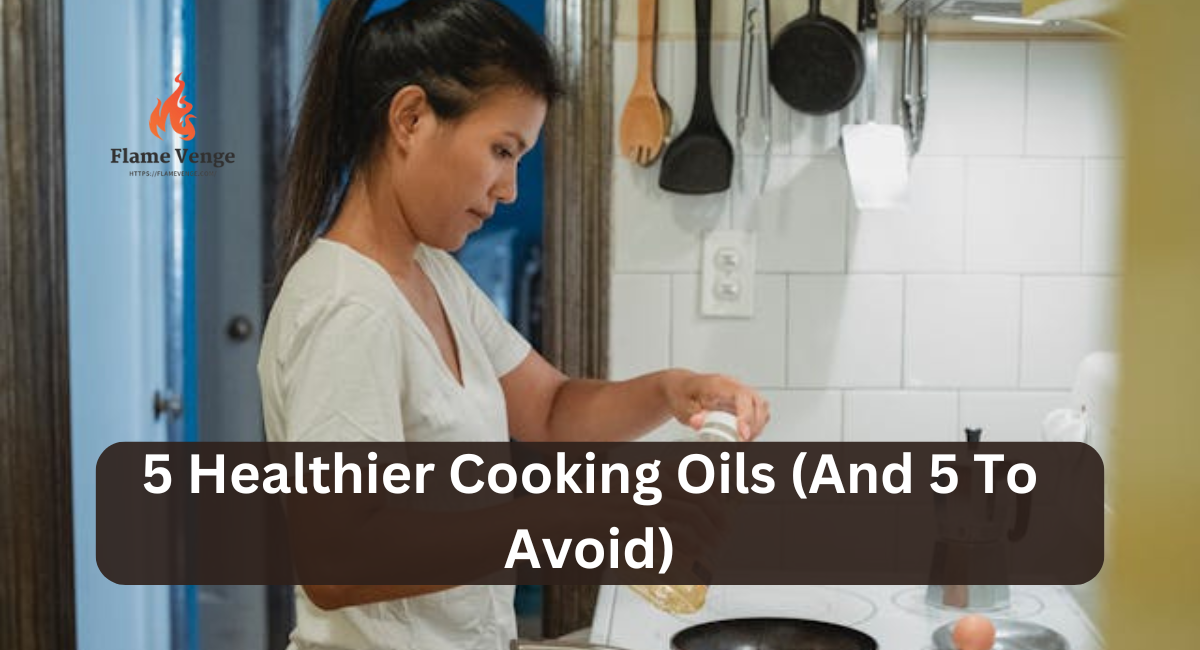The type of oil you use for cooking is really important for how healthy your food is. Different oils have varying levels of saturated fats, unsaturated fats, and other components that can influence heart health, weight management, and overall well-being. Knowing which oils to use and which to avoid is essential for maintaining a healthy diet.
5 Healthier Cooking Oils
1. Extra Virgin Olive Oil
Extra virgin olive oil is an significant part of the Mediterranean diet and is known for being very healthy. It has healthy fats that can help with inflammation and heart disease. Olive oil also contains antioxidants like polyphenols, which protect the body from oxidative stress and have anti-inflammatory properties.
Best Uses: EVOO is ideal for salad dressings, drizzling over cooked vegetables, or as a marinade base. Its relatively low smoke point (around 375°F or 190°C) makes it best for low—to medium-heat cooking.
2. Avocado Oil
Avocado oil is an excellent source of beneficial fats. Its high smoke point (around 520°F or 270°C) makes it versatile for various cooking methods, including frying, grilling, and roasting. Avocado oil is also rich in lutein, an antioxidant beneficial for eye health, and vitamin E, which supports skin health.
Best Uses: Avocado oil suits high-heat cooking, such as sautéing, frying, or grilling. It can also be used in salad dressings & dips.
3. Coconut Oil
Coconut oil has become popular because it has a special kind of fat called medium-chain triglycerides (MCTs) that are processed differently in the body than other fats. MCTs can provide a quick energy source and may have potential benefits for weight management. Coconut oil has many unhealthy fats, but one kind of saturated fat in it (lauric acid) might help lower cholesterol levels.
Best Uses: Coconut oil is best for baking, sautéing, and recipes where its distinct flavor complements the dish. Its smoke point is around 350°F (175°C), making it suitable for medium-heat cooking.
4. Canola Oil
Canola oil is good for your heart because it has healthy fats. It also has omega-3s that are good for your heart too. Canola oil doesn’t have a strong taste, so you can use it in many different recipes.
Best Uses: Canola oil is ideal for frying, baking, and stir-frying due to its high smoke point (around 400°F or 204°C). It can also be used in salad dressings and marinades.
5. Walnut Oil
Walnut oil has lots of omega-3 fatty acids, especially alpha-linolenic acid (ALA), which is good for your heart. It also contains polyunsaturated fats and antioxidants, contributing to its anti-inflammatory properties. Walnut oil has a unique, nutty taste that makes many dishes taste better.
Best Uses: Walnut oil is best used in salad dressings, drizzled over finished dishes, or cold dishes like smoothies. Its low smoke point (around 320°F or 160°C) makes it unsuitable for cooking at high temperatures.
5 Cooking Oils to Avoid
1. Vegetable Oil
Vegetable oil is usually a mix of different oils like soybean, corn, and sunflower. It is highly processed, which can remove beneficial nutrients and form unhealthy trans fats. Moreover, vegetable oils usually have a lot of omega-6 fats. Eating too much of these fats can cause inflammation and raise the chances of getting long-term illnesses.
Why to Avoid: Vegetable oil’s high omega-6 content and potential presence of trans fats make it a less healthy choice, especially when used frequently in cooking.
2. Palm Oil
Palm oil is commonly found in packaged foods because it is inexpensive and stays solid at room temperature. But it has lots of unhealthy fats that can raise bad cholesterol & lead to heart problems. Furthermore, palm oil production has significant environmental impacts, including deforestation and loss of biodiversity.
Why to Avoid: Palm oil has a lot of unhealthy fat and causes environmental issues, so people who care about their health may not want to use it.
3. Hydrogenated Oils
Hydrogenated oils, or trans fats, are made by adding hydrogen to liquid vegetable oils to make them solid. They are often in processed foods like margarine, snacks, and baked goods. Trans fats are bad for health because they raise bad cholesterol & lower good cholesterol, which can lead to heart disease, stroke, and diabetes.
Why to Avoid: The negative health impacts of trans fats are well-documented, and it is best to avoid hydrogenated oils altogether.
4. Corn Oil
Corn oil is a type of oil with a lot of omega-6 fatty acids. Having too much of them can upset the balance with omega-3 fatty acids and cause inflammation. Corn oil is also highly processed and often derived from genetically modified corn, which raises additional health and environmental concerns.
Why to Avoid: Corn oil’s high omega-6 content and potential for being genetically modified make it a less healthy option for regular use.
5. Soybean Oil
Soybean oil is one of the most commonly used oils in processed foods and fast food cooking. It has a lot of good fats, like omega-6, but too much can cause inflammation. Soybean oil is also highly processed and often derived from genetically modified soybeans.
Why to Avoid: Soybean oil’s potential for contributing to inflammation and association with processed foods make it a less desirable option for a healthy diet.
Conclusion
Selecting the correct cooking oil is very important for your health. Opt for extra virgin olive, avocado, and walnut oil, which offer heart-healthy fats and antioxidants. Avoid highly processed oils like vegetable, palm, and hydrogenated oils that can increase inflammation and heart disease risk. Making informed choices in cooking oils enhances meal nutrition and supports long-term well-being.

